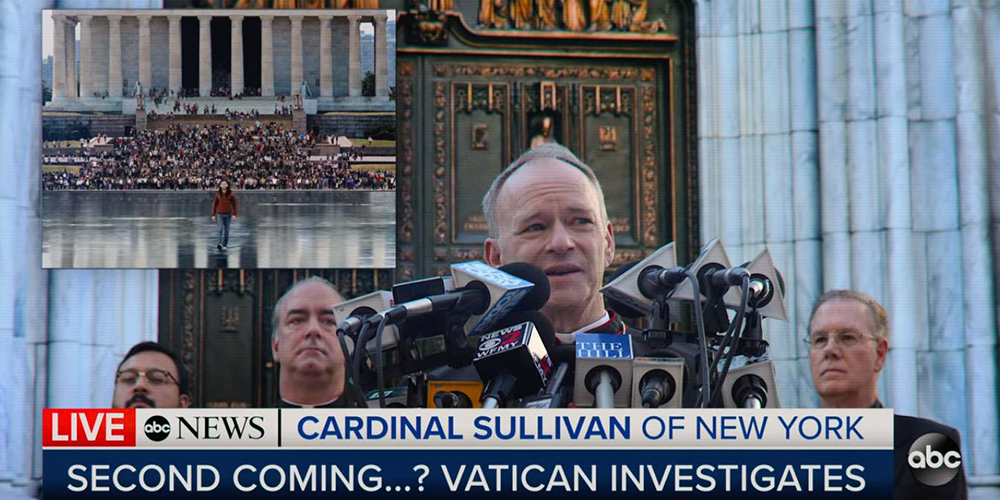As a reminder, my recaps are a little stream of consciousness, as I’m writing while I watch. Sometimes I might posit a theory that’s confirmed or disproven a few sentences later. Sometimes I’m guessing at what’s going on. I also take a “you’re sitting next to me on my couch while I watch” approach. That means you also get all my snarky comments as I watch. It’s part and parcel of watching TV with me.
We open this episode with announcements that 150,000 await word from the Pope at the Vatican, but the Vatican will only say that they are looking into a possible miracle. Thousands are descending on DC as riots break out in DC and nearby Baltimore. At a fancy hotel in DC, Felix, Anna, and Rebecca appear in a suite, surrounded by luxurious gifts and opening letters from random people filled with cash. Anna is skeptical of what happened, but Felix sees only confirmation of what he already believed. Anna asks what they should do with the influx of cash, and Felix says simply they’ll build Al-Masih’s church.
In the West Bank, a car carrying Jibril can hardly pass for crowds of people surrounding it to celebrate him. Across the desert in Jordan, Samer heads into lands unknown. It looks like his part of the story isn’t over yet. Even as Jibril is taken to a large, clean, white house, Samer and the other young men of the refugee camp are taken to a compound run by a teacher. That doesn’t sound like a training ground for bad things at all. Jibril is told that he is in danger for being a follower of Al-Masih, from Israelis and Muslims alike. He’s apparently still pretty unpopular back home.
In DC, Eva is laying out the case for Golshiri-as-terrorist to the President’s Chief of Staff. Golshiri’s plane that landed in Mexico was funded by Russia. The Chief doesn’t much care about any of that evidence, or the threat he might pose, he just wants dirt on Golshiri or a photo of him in a turban so they can slam him on whatever passes for Fox News in this world and move on, but Eva tries to push the idea that this is a different kind of fight. Elsewhere in the city, Rebecca is reviewing her Instagram and is getting cyberbullied by a bunch of randos online. She appears to take it pretty hard.
In class, only a few students bother to show up from the more than one hundred we saw in the previous episode. One young man, who was focused on in the last episode, is pretty upset. Another student shares his fear that Al-Masih is the real deal, because it would mean having to end life as they know it and follow him, which he’s not keen on. Yet another student notes that the return of the Messiah is supposed to signal a civilization-ending war. Interestingly, that’s a big part of what ISIS has been trying to spark in Syria for the last few years in the real world. Our main student dude leaves class and sees the front lawn of his university looking like Woodstock. Or maybe this is what all campuses look like. I went to a commuter school, so who knows. Students are laughing, praying, joking, crying, and in general feeling the full range of human emotions together.
Back at home, Staci’s husband gets a text from her with a news story of Al-Masih on the water, saying it’s proof that she’s not crazy, and implicitly justifying her kidnapping their daughter and rushing off to Texas, following a caravan of cars to DC, and then witnessing the event. Makes me wonder, though, if she heard the guy actually talk at the Reflecting Pool, where he made it pretty clear people coming to him with specific requests wouldn’t be happy. In DC, Staci somehow manages to walk right into a rather heavily guarded hotel where Al-Masih is staying. Meanwhile, Felix prepares to give a major address to the media and gathered religious figures. I give Felix credit for not trying to play the role of Al-Masih’s front man. He makes it clear that he does not speak for Al-Masih, and avoids any move toward cashing in on his the windfall someone in his position could likely gain. During the speech, Anna’s father shows up to watch. I get the feeling that Ed would have handled things differently. At the hotel, Staci gets all the way to Al-Masih’s room but is stopped by police. Al-Masih opens the door and offers to let the girl in, but only her. The two sit quietly together, but nothing appears to be happening. In a nearby room, Eva and FBI Man watch on a closed camera feed. Eva questions why Al-Masih would engage in what she clearly sees as a charade. In the lobby, Anna’s father stops Felix and, in the guise of offering to help him, basically asks if he wants to cash in on Al-Masih. Felix plays pious and demurs, closing the door in Ed’s face. Go Felix.
Later that night, Eva and FBI Man are still manning the cameras, but a bored Eva wanders off. In the hotel bar, she runs into Avi, who is for some reason still there, and at the same hotel. They talk about historical religious theory, where Eva paints a pretty hostile view of Christianity, and really religion in general, as a hoax. She then repeats her basic governing principle that all things are black or white, and that you can’t ever doubt something once you settle on it. Oy, that’s pretty bad. She says she learned all this from her mentor, who we find out is the same uncle referenced by the kid in the diner from the first episode. That kid is also the student we’ve been following. I didn’t make the connection before. She has coffee there at one in the morning and helps him with his schoolwork because her mentor meant so much to her. But the lesson she learned was to double down and never doubt once you choose a path.
Back in Jordan, Samer, dressed in white, is beginning some sort of education under their benefactor, the Sheikh. The Sheikh rails against Al-Masih as the Deceiver. In America, our young student from the previous few episodes is seen glaring at his Qur’an, clearing going through a crisis of faith. Later in the episode he quits his job at the diner, steals beer from a looted store, and stops in front of a small church where congregants loudly sing of the Messiah’s return. A woman invites him in, but he glares her down, too angry to do anything. In Palestine, Jibril is finally met by the man who is housing him, an older, kindly gentleman who praises Jibril’s accomplishment. The man asks Jibril what he plans to do, and Jibril answers simply that he’ll follow Al-Masih’s plan. The man asks Jibril for his plan, not Al-Masih’s, and this seems to bring Jibril up short, apparently never having contemplated it before.
Staci, driving her daughter out of DC, asks the little girl what happened with Al-Masih, but the little girl says nothing happened and she wants to go home. Staci appears distressed, perhaps finally contemplating it was all for nothing, or hoping the miracle may have already happened. Back at the hotel, FBI Man watches as the police pull away and a young woman appears at Al-Masih’s door. Well, this looks pretty sketchy. She approaches his room and says she is sick, and would like the same healing magic as the little girl from earlier. It’s pretty clear the young woman is trying to seduce Al-Masih, perhaps knowing that the FBI is watching. She was probably sent by the Chief of Staff looking for dirt. Al-Masih shuts her down pretty hard though. He deconstructs her psychology as a prostitute. She drops the façade and admits that she was sent there to sleep with him. He asks her to tell him her real name, and she does, Eliana. He says he loves her and she breaks entirely, apologizing for coming there and being part of the plot to discredit him. She says she thinks they are being watched, and leaves in tears as he says God loves her. FBI Man, watching the whole thing, is visibly affected by the performance.
In another hotel room, Anna is rifling through the minibar but decides against it. She and Felix have a nice moment where it looks like maybe some of the damage from the previous years of their lives is falling away a bit. Rebecca sneaks out of her room and sees Eliana leaving Al-Masih’s. She clearly doesn’t like that. The jealousy is palpable. Rebecca walks the streets of a city that appears to be falling apart, with rioters burning cars and police cruisers everywhere. Al-Masih shows up behind her on the street and they chat about what Rebecca thought she saw. She lashes out in jealousy but he tells her nothing happened, and assures her that he has a special place for her. I have to say, the line between being a powerful Messiah with a plan and an endearing cult leader who knows how to manipulate people is thin. Rebecca shares that she has visions that feel real, visions about everything they see coming to an end. Al-Masih tells her they are real. Our student friend wanders by with his stolen case of beer and calls him the False Prophet angrily. Al-Masih asks Rebecca if she will shed her burdens of pain and shame. Rebecca pretends to understand, but clearly she’s in love with him and she’d agree to anything. He puts his hands on her head like he’s going to kiss her, but they just stare at each other. Back at the hotel, Anna witnesses Rebecca return home and then pokes her head out into the hallway to see Al-Masih heading to his room. When he gets to his room, a bag is thrown over his head.
In Iran, Q is interviewing Adar, Payam’s brother. Adar reveals that his parents were killed fleeing Iraq. Their father was Jewish, their mother Christian. That explains Payam’s comment in a previous episode about learning Hebrew from his father, and how he knows so much about all three major religions being raised in all three faiths. But he was raised in Iran after 1990 by his uncle, which explains the accent Eva identifies. Adar says their uncle was a trickster named Yusuf the Magnificent. Yusuf pulled them from school and taught them the art of illusion from a master magician. Adar performs a quick trick showing him turning a pencil into a pen. It’s a convincing trick. Adar says the trick isn’t the thing that’s happening, it’s making you believe in the thing that’s happening.
Back at the university, our young student friend is having a bonfire made of all his school papers and textbooks in front of the university church. It seems, as Al-Masih said previously to Eva, that everyone believes in something, and what’s happening is causing a crisis of faith across many, many different beliefs.
Let’s check in on my theories from the first episode:
- He really is the Messiah, the second coming, and God has a message that he’s not pleased, and folks have been misinterpreting his vision for mankind for a couple thousands years, so he sent this dude to correct the record.
What do I think of this theory? As this show is wont to do, it crossed back the other way this week into feeding the conspiracy angle of things. Nothing Al-Masih did this week really suggests anything supernatural. But it’s still a viable option at the moment. No matter what, I’m either convinced that he’s up to no good, or, that he’s in some sense beyond good and evil. But either way, I don’t think this ends with utopia.
- It’s a government conspiracy / It’s someone else’s conspiracy
Tons of new evidence this week, of course, because the show tends to bounce and forth pretty regularly between these theories. It’s a little ham-handed to so clearly hammer away at one thing one episode and go 180 degrees the next episode. So we know he was trained as a master illusionist by his uncle, and as a grifter and trickster, which explains a lot of the skills and feats he performs throughout the show. The whole scene with the prostitute really doesn’t require any magic, just a good understanding of people and psychology to pull off. A powerful skill, to be sure, but not a supernatural one.
- What’s going on with Jibril?
Not much with Jibril or Sameer this episode. But for the first time, he’s questioning whether or not he should be following or charting his own path. I mainly find this interesting because the previous episode set Jibril up to have some sort of divine connection. Is he powerful like Al-Masih, or powerful like Rebecca? Or neither? Either way, he looks likely to remain a key character, and I suspect that means he will grow as a force. If this is the first move to step outside Al-Masih’s shadow and follow his own path, I could really see this leading up to an actual power play between the two of them, and that’s really interesting.
General thoughts so far: All shows occasionally need a slower episode after a series of big reveals to let the narrative breathe, to recap some of what’s happened, to slowly nudge in new directions, etc. This was that episode. Those episodes might be necessary, but they’re also kind of boring. Much of what’s happening seems superfluous, and some of the tricks the show likes to employ are losing their zazzle a little bit. I’m growing less interested in the side quests, but still curious to see where the main storyline with Al-Masih goes.
Episode grade: B- (As we get seven episodes in, the yo-yo effect between “He’s the Messiah” and “He’s a fake!” is grating. Pick a lane.)








